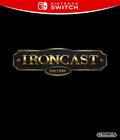Buy Ironcast
The Nintendo Switch already has quite a few genres represented. For more traditional puzzle games, there are Puyo Puyo Tetris and Magical Drop II. For a roguelike, there's The Binding of Isaac: Afterbirth+, and I Am Setsuna covers the RPG genre. Despite all of that, Ironcast deserves attention since it combines all three of those things into a game that is tough but still satisfying.
In an alternate version of a steampunk-inspired 19th century Europe, a new source of energy named Voltite was discovered by the French. It provided France with the power to become a technologically advanced nation. Due to their reluctance to share the newfound energy, the British were forced to steal a sample, causing a great war between the nations. After years of stalemate, a bipedal tank called the Ironcast was produced. Guided by a guild that only wants to see the war end, players are in charge of piloting one of these machines to finally bring about peace.
Players experienced in Puzzle Quest or similar games know what to expect. Given a playfield of gems, players must match three in a row to receive the necessary energy to go on the offensive or defend from enemy attacks. The matched colors correspond to different actions, so matching is more strategic and requires thinking about what to match instead of just going for the first possible thing.
The core gameplay differences are pretty significant. Players tie up adjacent gems of the same color with a string that connects in either the four main directions or diagonally. There are also special gems that provide some nice extras if they're connected in a match. Junk gems grant extra cash for upgrades while another kind lets players link gems of different colors for a chance to create some wildly long strings.
The overall flow is rather unusual but interesting. The enemy never makes matches of its own, but players get three turns to make matches before the enemy reacts and uses an ability. The player's turns only count for making matches, however, so he/she can pile on numerous abilities before making a match.
Ironcast's roguelike influence is presented in a number of ways. Each bout may require defeating the enemy, negotiations that don't involve violence, or avoiding damage to a particular enemy part so it can be salvaged for scrap. Those modes can also have some extra restrictions, such as having to complete the mission is a specific number of moves. Finishing any of the restrictions grants a reward of scrap, which can be used to purchase better weapons or heal.
The upgrades become a source of strategy, since there's always a time limit between big boss fights, giving players a few days to get fitted for the battle. It's important to peruse which upgrades to go for and whether healing is needed, since overall health is carried over between matches. A big gun might make short work of minions, but it can also falter against the bosses. Extra crewmen, on the other hand, don't do anything until a boss is reached, but when the time arrives, they make a huge difference in chipping away at that larger health bar. As a result, most of the time between puzzles is spent second-guessing one's decisions.
Defeat will eventually occur, and when it does, players are sent back to the very beginning of the game and must restart the campaign. The XP gained thus far is deposited into a different XP pool, and leveling up there grants some significant permanent upgrades, like stat boosts. It also opens up a wider variety of ironcasts for use, so players aren't stuck with the base model for the duration of the game.
As such, Ironcast mimics its plot closely, as it becomes a game of attrition. Dying is a common occurrence, and unless you're always performing good runs, the overall leveling can be quite slow. The random mission flow keeps things fresh, but players won't see significant progress in the campaign until they've invested time in the grind. It is a signature element of the roguelike genre, but that doesn't sit well with everyone. The game is quite long, so players will certainly feel like they got their money's worth.
Compared to the PC version, there's not much different here. Beyond the other ironcasts that were available as DLC before, the content is practically the same. The difference, then, lies in the control scheme, which lets players use the joy-cons or the touch-screen to control the action. The joy-cons do a fine job, but the game is much better with the touch-screen, as it offers precision and familiarity for those who play most of their puzzle games on the phone or tablet.
In terms of presentation, the game is fine but not stunning. Everything from the backgrounds to the character designs and war machines look and animate nicely, but they're all presented in dull colors. The same goes for the music, which is nice enough but not exactly something that rouses the urge to fight. Granted, puzzle games don't need amazing aesthetics, but it doesn't hurt to look nice, either.
Ironcast rewards those who aren't easily frustrated by loss. The constant losing can be discouraging, but the incremental progress made through each defeat means the game eventually gets easier and more satisfying. It also helps that the only mode happens to be long enough to sustain many losses, so it'll be quite some time before players reach the end. For puzzle fans who crave difficulty, Ironcast is worth checking out.
Score: 8.0/10
More articles about Ironcast











 Ironcast is a turn-based steampunk mech combat game inspired by Victorian-era science fiction writers such as H.G. Wells and Jules Verne.
Ironcast is a turn-based steampunk mech combat game inspired by Victorian-era science fiction writers such as H.G. Wells and Jules Verne.




















